Features
How a Feminist Foreign Policy could lay the basis for a more peaceful world
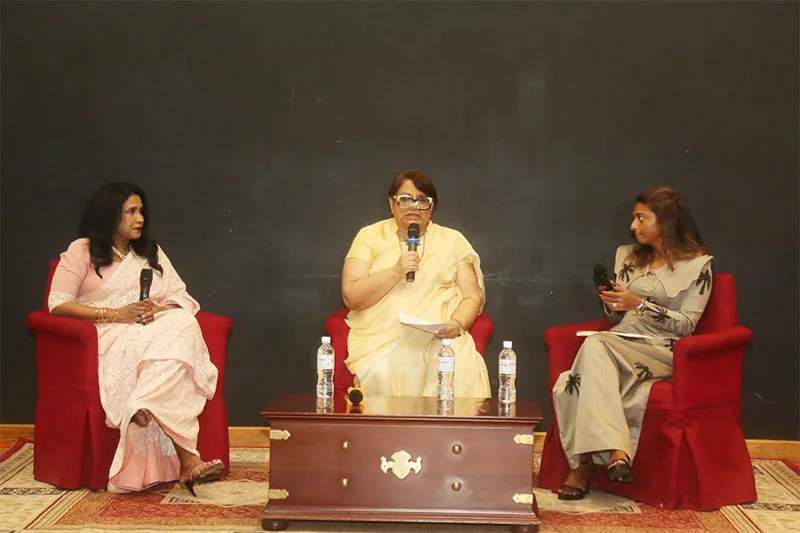
 Looking at foreign policy questions from a feminist viewpoint may strike many in even the world of democracy as quite a new approach to studying external policy issues but this perspective has been around for quite some time and it would be in the interest of states and publics to take profound cognizance of it. This is in view of the implications of the perspective for international peace and stability.
Looking at foreign policy questions from a feminist viewpoint may strike many in even the world of democracy as quite a new approach to studying external policy issues but this perspective has been around for quite some time and it would be in the interest of states and publics to take profound cognizance of it. This is in view of the implications of the perspective for international peace and stability.
Given this backdrop, it was in the fitness of things for the Bandaranaike Centre for International Studies (BCIS) Colombo, a major pioneer in the teaching and researching of International Relations in Sri Lanka, to set off special time to introduce and discuss Feminist Foreign Policy (FFP) recently. The relevant symposium was the final one in a series of forums of importance to foreign and domestic policy issues the BCIS conducted in the course of November this year to celebrate the 50th anniversary of its founding.
Titled ‘Leadership for Peace and Feminist Foreign Policy’, the forum was held on December 9th at the BMICH’s ‘Mihilaka Madura’ under the aegis of the BCIS, headed by the latter’s Executive Director Priyanthi Fernando. Prominent among the members of the audience at the symposium was the Chairperson of the BCIS, former President Chandrika Bandaranaike Kumaratunga.
The panelists at the forum were Prof. Rangita de Silva de Alwis, Associate Dean of International Affairs, University of Pennsylvania Law School, USA and an Expert Member on the CEDAW and Eva Abdullah, Chairperson, Maldives Policy Think Tank and a former Deputy Speaker of the People’s Majlis of the Maldives. The symposium was moderated by Dr. Radhika Coomaraswamy, former UN Under-Secretary General and Special Representative of the Secretary General on Children and Armed Conflict (2006-2012).
Prof. Rangita de Silva, among other things, pointed to the importance of re-imagining FFP and making it increasingly relevant in the formulation of a country’s foreign policy. She said that going forward, foreign policy will need to be increasingly based on a feminist perspective and there are some major countries of the South and North that have already given their external policies this orientation. It was pointed out that by 2025, France, for example, would be taking this policy direction; that is, the best interests of France’s women would be taken into consideration in the formulation and implementation of foreign policy.
Chile, the same speaker pointed out, a major country of the South, is in the forefront of integrating or merging its domestic and foreign policies with a view to prioritizing the legitimate interests of women in the crafting of its external policy.
Eva Abdullah pointed to the crucial contribution women make to a country’s economy. Women in the Maldives, she said, work 19 hours a day. She cogently elaborated that economic instability is a chief causative factor in the disruption of peace and stability in a country, in view of its subtle capability to undermine a country’s material wellbeing. The latter, in turn, causes social disaffection and unrest. But, generally, the factors seen as undermining a country’s peace are physical conflict and war; that is, overt violence.
However, it is important to come to grips with the less visible or more subtle destroyer of peace, which is economic instability. This form of instability, it was pointed out, has grave long term consequences. For instance, a country’s economic ruin is virtually inherited by every new born infant, since a country in debt is obliged to repay such loans and it falls to future generations to do so.
Abdullah went on to elaborate that economic austerity measures undertaken by a country in debt, for example, while disruptive of peace, exert a deleterious impact on particularly women and other vulnerable groups. After all, the contribution of women to the GDP of a country is inestimable. This is all the reason why women’s issues need to be brought to the forefront of foreign policymaking.
In other words, foreign policy, Abdullah pointed out, is essentially all about the promotion of human rights. Since such rights are insidiously undermined during times of economic austerity; debt issues, which come to the fore during economic crises in particularly the South, cannot be viewed in isolation from women’s issues and external policy.
Thus, the forum raised issues of crucial importance to foreign policy formulation which countries of the South in particular need to take into account very seriously, going forward. At the end of the symposium a Q&A followed where many an issue of relevance was taken up for discussion.
It ought to be clear to the unbiased observer and commentator that a feminist perspective in foreign policy is of crucial significance to the process referred to as democratic development. The latter signifies growth in tandem with redistributive justice. It goes without saying that foreign and domestic policies that do not help in furthering these aims serve no useful purpose. Thus, a feminist foreign policy and its underlying principles cannot be glossed over or ignored in the process of external policy formulation and implementation.
Generally, a woman’s contribution to a country’s GNP and overall wellbeing goes largely undocumented and unappreciated. For example, women work selflessly and silently in their homestead, but no official price tag is attached to such labour which is instrumental in ‘keeping the home fires burning’. Accordingly, the panelists’ observation that foreign policy in the real and feminist sense is essentially all about the promotion of human rights amounts to an insight of great worth.
Features
Govt. needs to explain its slow pace
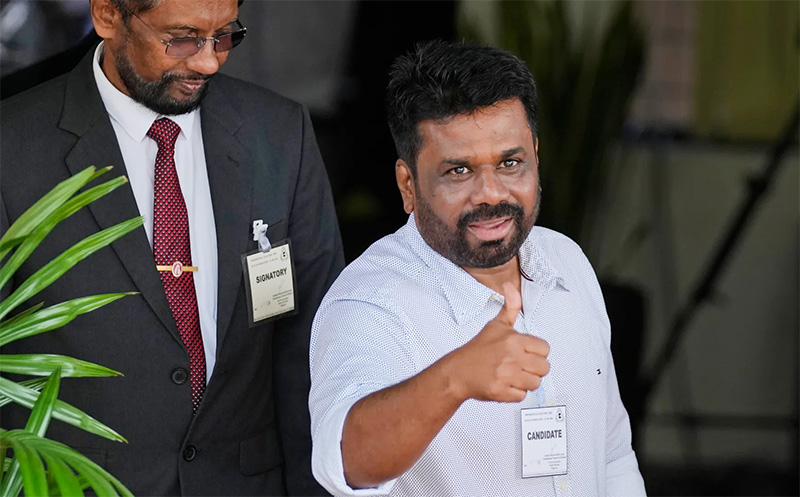
by Jehan Perera
It was three years ago that the Aragalaya people’s movement in Sri Lanka hit the international headlines. The world watched a celebration of democracy on the streets of Colombo as tens of thousands of people of all ages and communities gathered to demand a change of government. The Aragalaya showed that people have the power, and agency, to make governments at the time of elections and also break governments on the streets through non-violent mass protest. This is a very powerful message that other countries in the region, particularly Bangladesh and Pakistan in the South Asian region, have taken to heart from the example of Sri Lanka’s Aragalaya. It calls for adopting ‘systems thinking’ in which there is understanding of the interconnectedness of complex issues and working across different sectors and levels that address root causes rather than just the symptoms.
Democracy means that power is with the people and they do not surrender it to the government to become inert and let the government do as it wants, especially if it is harming the national interest. This also calls for collaboration across sectors, including political parties, businesses, NGOs and community groups, to create a collective effort towards change as it did during the Aragalaya. The government that the Aragalaya protest movement overthrew through street power was one that had been elected by a massive 2/3 majority that was unprecedented in the country under the proportional electoral system. It also had more than three years of its term remaining. But when it became clear that it was jeopardizing the national interest rather than furthering it, and inflicted calamitous economic collapse, the people’s power became unstoppable.
A similar situation arose in Bangladesh, a year ago, when the government of Sheikh Hasina decided to have a quota that favoured her ruling party’s supporters in the provision of scarce government jobs to the people. In the midst of economic hardship, this became a provocation to the people of Bangladesh. They saw the corruption and sense of entitlement in those who were ruling the country, just as the Sri Lankan people had seen in their own country two years earlier. This policy sparked massive student-led protests, with young people taking to the streets to demand equitable opportunities and an end to nepotistic practices. They followed the Sri Lankan example that they had seen on the television and social media to overthrow a government that had won the last election but was not delivering the results it had promised.
CONSTITUTIONAL PROCESS
Despite similarities, there are also major differences between Bangladesh and Sri Lankan uprisings. In Sri Lanka, the protest movement achieved its task with only a minimal loss of life. In Bangladesh, the people mobilized against the government which had become like a dictatorship and which used a high level of violence in trying to suppress the protests. In Sri Lanka, the transition process was the constitutionally mandated one and also took place non-violently. When President Gotabaya Rajapaksa resigned, Prime Minister Ranil Wickremesinghe succeeded him as the acting President, pending a vote in Parliament which he won. President Wickremesinghe selected his Cabinet of Ministers and governed until his presidential term ended. A new President Anura Kumara Dissanayake was elected at the presidential elections which were the most peaceful elections in the country’s history.
In Bangladesh, the fleeing abroad of Prime Minister Hasina was not followed by Parliament electing a new Prime Minister. Instead, the President of Bangladesh Mohammed Shahabuddin appointed an interim government, headed by NGO leader Muhammad Yunus. The question in Bangladesh is how long will this interim government continue to govern the country without elections. The mainstream political parties, including that of the deposed Prime Minister, are calling for early elections. However, the leaders of the protest movement that overthrew the government on the streets and who experienced a high level of violence do not wish elections to be held at this time. They call for a transitional justice process in which the truth of what happened is ascertained and those who used violence against the people are held accountable.
By way of contrast, in Sri Lanka, which went through a legal and constitutional process to achieve its change of government there is little or no demand for transitional justice processes against those who held office at the time of the Aragalaya protests. Even those against whom there are allegations of human rights violations and corruptions are permitted to freely contest the elections. But they were thoroughly defeated and the people elected a new NPP government with a 2/3 majority in Parliament, many of whom are new to politics and have no association with those who governed the country in the past. This is both a strength and a weakness. It is a strength in that the members of the new government are idealistic and sincere in their efforts to improve the life of the people. But their present non-consultative and self-reliant approach can lead to erroneous decisions, such as to centrally appoint a majority of council members, who are of Sinhalese ethnicity, to the Eastern University which has a majority of Tamil faculty and students.
UNRESOLVED PROBLEMS
The problem for the new government is that they inherited a country with massive unresolved problems, including the unresolved ethnic conflict which requires both sensitivity and consultations to resolve. The most pressing problem, by any measure, is the economic problem in which 25 percent of the population have fallen below the poverty line, which is double the percentage that existed three years ago. Despite the appearance of high-end consumer spending, the gap between the rich and poor has increased significantly. The day-to-day life of most people is how to survive economically. The former government put the main burden of repaying the foreign debts and balancing the budget on the poorer sections of the population while sparing those at the upper end, who are expected to be engines of the economy. The new government has to change this inequity but it has little leeway to do so, because the government’s treasury has been emptied by the misdeeds of the past.
Despite having a 2/3 majority in Parliament, the government is hamstrung by its lack of economic resources and the recalcitrance of the prevailing system that continues to be steeped in the ways of the past. President Dissanayake has been forthright about this when he addressed Parliament during the budget debate. He said, “the country has been transformed into a shadow criminal state. While we see a functioning police force, military, political authority and judiciary on the surface, beneath this structure exists an armed underworld with ties to law enforcement, security forces and legal professionals. This shadow state must be dismantled. There are two approaches to dealing with this issue: either aligning with the criminal underworld or decisively eliminating it. Unlike previous administrations, which coexisted with organized crime, the NPP-led government is determined to eradicate it entirely.”
Sri Lanka’s new government has committed to holding local government elections within two months unlike Bangladesh’s protest leaders, who demand that transitional justice and accountability for past crimes take precedence over elections. This decision aligns with constitutional mandates and upholds a Supreme Court ruling that the previous government had ignored. However, holding elections so soon after a major political shift poses risks. The new government has yet to deliver on key promises—bringing economic relief to struggling families and prosecuting those responsible for corruption. It needs to also address burning ethnic and religious grievances, such as the building of Buddhist religious sites where there are no members of that community living there. If voters lose patience, political instability could return. The people need to be farsighted when they make their decision to vote. As citizens they need to recognise that systemic change takes time.
Features
The Gypsies…one year at a time
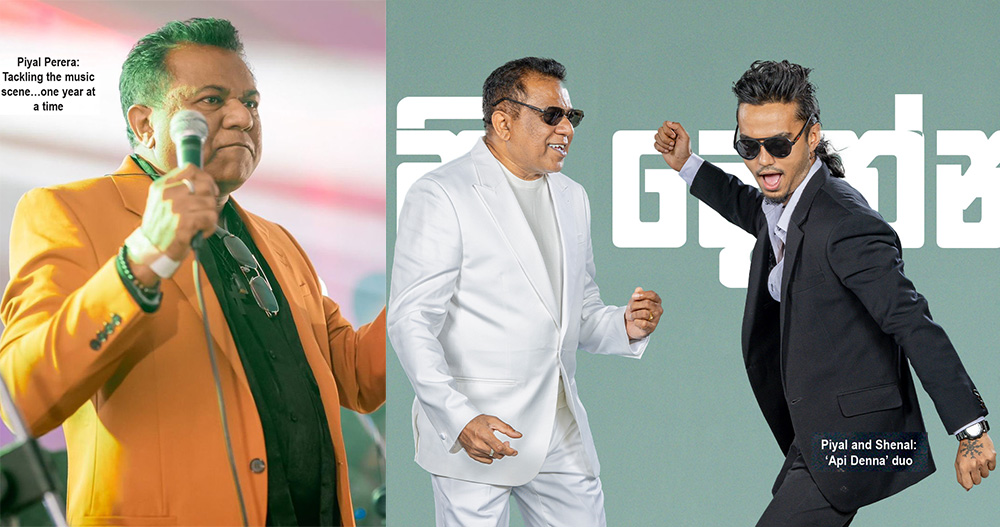
 After the demise of Sunil Perera, referred to by many as Sri Lanka’s number one entertainer/singer, music lovers believed that The Gypsies would find the going tough in the music scene.
After the demise of Sunil Perera, referred to by many as Sri Lanka’s number one entertainer/singer, music lovers believed that The Gypsies would find the going tough in the music scene.
Sunil was the star of The Gypsies and what he created on stage was loved by all, and there was never a dull moment when this great entertainer was in the spotlight.
His brother Piyal Perera, who is now in charge of The Gypsies, admitted that after Sunil’s death he was in two minds about continuing with The Gypsies, and, he says, he mentioned it to the rest of the members.
“However, the scene started improving for us and then stepped in Shenal Nishahanka, in December 2022, and that was the turning point.”
Shenal is, in fact, a rocker, who plays the guitar, and is extremely creative on stage with his baila.
He has already turned out to be a great crowd puller, and with Shenal in their lineup, Piyal then decided to continue with The Gypsies, but, he added, “I believe I should check out our progress in the scene…one year at a time.”
He was happy with the setup in 2023 and then decided that they continue in 2024, as well.
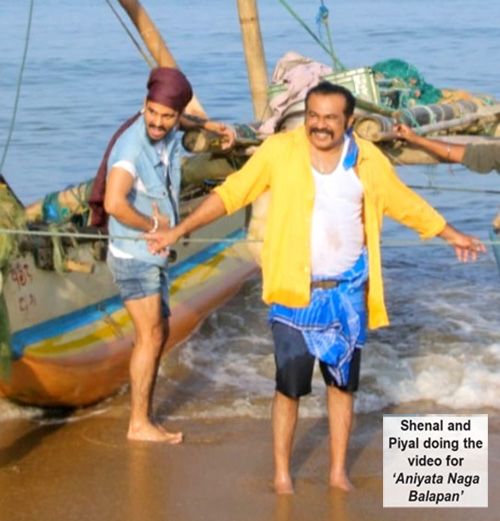 “The year 2024 was equally good, and 2025 has opened up with plenty of action for us, and so we will continue, and then checkout 2026.”
“The year 2024 was equally good, and 2025 has opened up with plenty of action for us, and so we will continue, and then checkout 2026.”
Their first foreign assignment, for this year, was for a Valentine’s Day dance in Dubai.
What’s more, The Gypsies schedule for 2025 includes gigs in Italy, France, Germany, and a one month tour of the USA in October.
They have also released a song ‘Aniyata Naga Balapan,’ created in a video format – filmed at a location in Negombo – with Piyal and Shenal in the vocal spotlight.
Piyal says this particular song was done when Sunil Perera was around and he used to sing it, occasionally, at stage shows, but they never got down to recording it.
With Monique Wille’s departure from the band, after more than a decade as their female vocalist, The Gypsies now operate without a female vocalist.
“If a female vocalist is required for certain events, we get a solo female singer involved, not as a band member. She does her own thing and we back her.”
Piyal and Shenal also move into action as ‘Api Denna’ and, Piyal says, they will continue this duo scene, even after The Gypsies ‘call it a day.’
And…according to Piyal, the end of The Gypsies could eventually happen in the year 2027.
The band has been in existence for 56 years!
Features
Colombians and the JVP: Puppetry a la the CIA

by Gamini Seneviratne
Our electors must be baffled by what those who call themselves “JVP” have been doing in the past few months in which they have enjoyed the right to exercise state power. One has to look not just at events here but to developments centered on shall we say NATO and its investments in politicians in the global South.
To begin to understand all that we need to go back to what is regarded as the beginning here – the insurrection of 1971. It has been portrayed as an armed uprising by ‘socialists’ / ‘communists’ who were either Russia-oriented ‘Stalinists’ or who, on waking up each morning, engaged in a ritual reading of Chairman Mao’s little Red Book.
And what indeed provoked that effort to acquire arms for the supposed revolution by raiding Police Stations (which were known to have some 202 or 303 rifles that were in firing order. In that exercise the government responded by sending in army volunteers who proved to be somewhat better equipped than the Police and even less disciplined in combat situations than they. Their overall commander, Rohana Wijeweera, alas, was captured before the action began: he had lain in wait where routine Police patrols were known to take place and had taken to his heels when they appeared. He was taken into custody (which provided him with safe harbour behind prison walls). In later years, Somawansa Amarasinghe, another ‘leader’ sought refuge overseas well in time.
Even more interesting than such detail was the fact that it was a revolt against a coalition of left / left of center political parties (SLFP, LSSP, Communist parties) that had scored a handsome electoral victory against the then and forever mish-mash of politikkas that are usually classified as a rightwing group, the UNP. That coalition had set in motion programmes to bring under State control or otherwise ‘socialising’ “the commanding heights of the economy”.
They had also outlawed South Vietnam, Israel and Taiwan that served not so much as outposts of the imperial ambitions of the US policy makers but served the market, notionally monitored by the Pentagon, for the weaponry of the arms manufacturers.
A Lankan government that does such outrageous things had to be toppled – in what has entered the literature as ‘regime change’. Relatively recent successes of such US ‘policy’ interventions are Ukraine (where ‘NATO’ removed the president elected by the people and thrust in their puppet cum mouthpiece), and the criminal assault on governance honoured in Pakistan by the vast majority of electors led by Imran Khan, the most honourable and competent figure by far in all of South Asia
And, all the while that fountain of Democracy, Human Rights and other such laudables as International Law, yes, the USA, was continuing to fund research organisations including Universities to produce ever more lethal weaponry for use against the people, all non-human of course, of Asia, Africa, Latin America and the ‘Middle East’.
All that has of course been a continuation of the ‘Manhattan Project’ that had made it possible for “America” to destroy Hiroshima & Nagasaki when Japan was on the cusp of surrendering to the Russian forces that were already across the waters in Manchuria and the northern islands of Japan.
There’s a clear difference though in terms of ‘American’ priorities: the scale of investment on war has been blown up from millions of dollars to billions and on to trillions. How does it fund such a “growth” in “investment”? Besides making health care and education virtually unaffordable, it has worked on expanding a landscape of homelessness while its investment in prisons, in arming Police to enable them to Keep the Peace and weaving garlands to honour the National Rifle Association (NRA).
But regardless of all such efforts we should never lose sight of the investment that underpins them all: the manufacture and dissemination of lies: you could call them fabrications or spin or, as is today the preferred characterization, ‘media bias’ (which is also sought to be sanitised as ‘double-standards’ and ‘hypocrisy’). The investments on all that might, for all we know, be in $$ billion in their uppermost range.
And it has become impossible to overlook the investment in politicians from the sub-State level to Congress and the White House. To all of which we must add what common superstition used to say was Unthinkable: the Judiciary.
It should be noted too that such as Soththi Upali should not be regarded as architects of a new political culture. The association/camaraderie between politicians and members of the underworld has a long history in most parts of a world that is said to thirst for democracy.
It should baffle nobody that the trial of the ‘socialists’ bent on regime change in 1971 was attended every day by Mr. R Premadasa. Or, that Wijeweera’s last request to his captors was that he be taken before the then power-wielder, Premadasa.
Now, we see in the Janatha Vimukthi Peramuna or “NPP’ (or, in an attempt at a more sophisticated try at misleading them, “Malimava” or ‘the Compass’) what these supposed ‘socialists’ really are or wish to see for the country or for themselves in their lifetime.
The raggers at places of higher education target the brighter entrants to them in a scenario that led them, ab initio, to murder such beneficiaries of the people as, say, Dr. Rex de Costa, (way back in 1971 up in Deniyaya).
It should come as no surprise then that the objectives that have been fed to the JVP” has required them to support raggers and to focus on damaging its own leaders such as Weerawansa, who show signs of helping the country and combating the forces led by the CIA.
When, themselves, in a position of power, those blessed by them have demonstrated just whom they represent. By way of example one would have to examine what, as Minister of Agriculture, etc., AKD actually did twenty years ago. The restoration of 10,000 small tanks was touted by the JVP as the foundation for the redevelopment of an agrarian culture: AKD never pursued that but quite recently it was proclaimed that he had the distinction of ‘cleaning up’ the Kandy Lake (the good-to-see and walk around bit of water that tourists love). There could be no clearer example than that of the cynicism that envelops their ‘thinking’.
The hand of ‘the CIA’ has been long visible on many fronts. And in that the support of the IMF has always been crucial to the project of destabilisation. One might think that it all began with JRJ’s enabling of corruption, but then one comes with examples from much earlier. J’s drive post 1977 was preceded by, say, the battle for the Freedom of the Press (so vital for the survival of a fascist regime) in 1964 that was greased by a hand-out of 20,000 rupees each to the MPs who crossed the floor and of much more to C.P .de Silva, who led that walk. That operation was orchestrated by Esmond Wickremasinghe.
That such funding has always tended to be the needful back-stop of politics is not disputed but ‘regime change’ requires much stronger instruments of shall we say ‘investment’ in which the IMF plays a commanding role. Much has been the praise bestowed on Dr. Manmohan Singh recently to mark his passing; what I recall is Dr. Gamani Corea (Chairman of the South Commission when Dr. Singh was its Secretary) telling me that he had asked Dr. Singh what he was up to as the Finance Minister of India and that Dr. S had dodged giving him an answer: well, part of the IMF package that Manmohan shoved on India was a targeted explosion of corruption within the government. Your readers would not require you to quote examples for them of what’s been going on here.
And, nowadays the CIA in the form of the US Ambassador, has shown its hand yet again: Ms. Chung, whose role in inducting an unabashed Colombian, into Parliament via the JVP has been quite obvious, has chosen to go public with their support for the unabashed co-leader of the corrupt strand of the Rajapaksas.
-

 News4 days ago
News4 days agoPrivate tuition, etc., for O/L students suspended until the end of exam
-
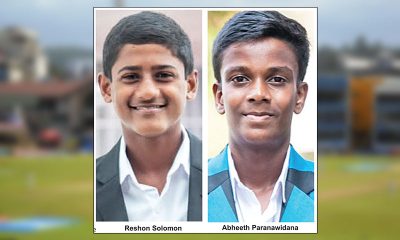
 Sports7 days ago
Sports7 days agoThomians drop wicket taking coloursman for promising young batsman
-
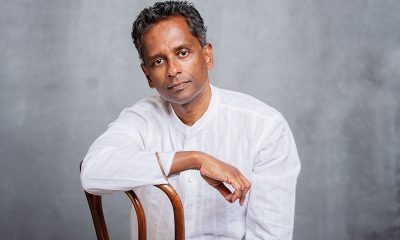
 Features5 days ago
Features5 days agoShyam Selvadurai and his exploration of Yasodhara’s story
-

 Editorial6 days ago
Editorial6 days agoCooking oil frauds
-

 Features7 days ago
Features7 days agoLife, happiness, and the value of existence
-

 Latest News3 days ago
Latest News3 days agoS. Thomas’ beat Royal by five wickets in the 146th Battle of the Blues
-
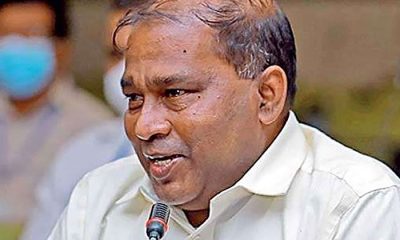
 News4 days ago
News4 days agoTeachers’ union calls for action against late-night WhatsApp homework
-

 Editorial3 days ago
Editorial3 days agoRanil roasted in London











